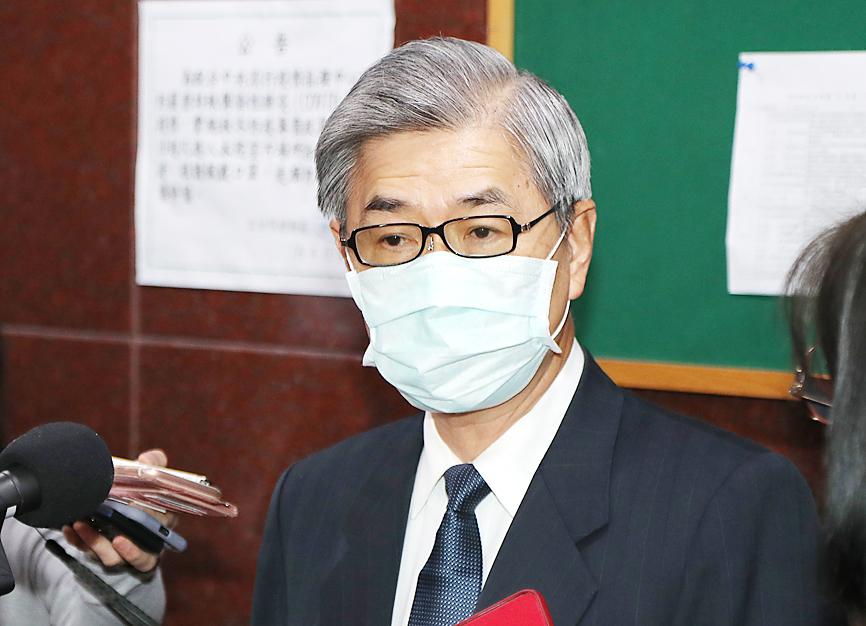The Financial Supervisory Commission (FSC) is looking into ways to monitor suspected stock market manipulation on Clubhouse, an audio-centered, invite-only social media platform, commission chairman Thomas Huang (黃天牧) said yesterday.
The emergence of the new social network “may pose a challenge to our regulations,” Huang told a meeting of the Legislative Yuan’s Finance Committee in Taipei.
Chinese Nationalist Party (KMT) Legislator Lee Guei-min (李貴敏) raised doubts over the FSC’s ability to spot suspected scams on Clubhouse.

Photo: CNA
“How can the FSC, the Taiwan Stock Exchange [TWSE] or the Taipei Exchange [TPEX] catch manipulation if no officials at these agencies have been invited to the network?” Lee asked.
Clubhouse bars voice recording without the consent of every speaker in a chat room, which might create a loophole for stock manipulators and make supervision more difficult for the regulator, Lee said.
Huang said that he has never used Clubhouse, but has asked the Securities and Futures Bureau to explore the issue and propose measures against manipulation on the platform.
“The TWSE and the TPEX have utilized software, such as Web crawler tools, to catch suspicious texts related to manipulation on social media. However, they might have to adopt a new approach to catch criminals on the audio-only Clubhouse,” Huang said.
It is okay for investors to discuss stocks online, but it would amount to market manipulation if investors, with an intent to influence share prices, spread rumors or false information, or perform other manipulative acts online, Securities and Futures Bureau Deputy Director-General Tsai Li-ling (蔡麗玲) said by telephone yesterday.
“Two things separate ordinary conversation from market manipulation: Whether the Internet user’s comment causes changes in share prices and whether they have an intent to influence share prices,” Tsai said.
Sometimes it is hard to detect stock manipulation only by reading the text messages, Tsai said.
However, when agencies notice abnormal volatility in a stock price, they would trace and find out who made the transactions, and check their Internet comments to determine whether they have intended to inflate or deflate stock prices to make money, Tsai said.
However, the approach does not always work, as people hide their identity online and sometimes it is difficult to hold them accountable, TWSE spokesperson Rebecca Chen (陳麗卿) said by telephone.
The FSC sometimes relies on tip-offs to solve crimes committed on social media platforms with entrance barriers or that encrypt users’ conversations, Tsai said, adding that the bureau has solved some cases thanks to people who have noticed illegal asset management activity in chat groups on the Line messaging app.

WEAKER ACTIVITY: The sharpest deterioration was seen in the electronics and optical components sector, with the production index falling 13.2 points to 44.5 Taiwan’s manufacturing sector last month contracted for a second consecutive month, with the purchasing managers’ index (PMI) slipping to 48, reflecting ongoing caution over trade uncertainties, the Chung-Hua Institution for Economic Research (CIER, 中華經濟研究院) said yesterday. The decline reflects growing caution among companies amid uncertainty surrounding US tariffs, semiconductor duties and automotive import levies, and it is also likely linked to fading front-loading activity, CIER president Lien Hsien-ming (連賢明) said. “Some clients have started shifting orders to Southeast Asian countries where tariff regimes are already clear,” Lien told a news conference. Firms across the supply chain are also lowering stock levels to mitigate

IN THE AIR: While most companies said they were committed to North American operations, some added that production and costs would depend on the outcome of a US trade probe Leading local contract electronics makers Wistron Corp (緯創), Quanta Computer Inc (廣達), Inventec Corp (英業達) and Compal Electronics Inc (仁寶) are to maintain their North American expansion plans, despite Washington’s 20 percent tariff on Taiwanese goods. Wistron said it has long maintained a presence in the US, while distributing production across Taiwan, North America, Southeast Asia and Europe. The company is in talks with customers to align capacity with their site preferences, a company official told the Taipei Times by telephone on Friday. The company is still in talks with clients over who would bear the tariff costs, with the outcome pending further

Six Taiwanese companies, including contract chipmaker Taiwan Semiconductor Manufacturing Co (TSMC, 台積電), made the 2025 Fortune Global 500 list of the world’s largest firms by revenue. In a report published by New York-based Fortune magazine on Tuesday, Hon Hai Precision Industry Co (鴻海精密), also known as Foxconn Technology Group (富士康科技集團), ranked highest among Taiwanese firms, placing 28th with revenue of US$213.69 billion. Up 60 spots from last year, TSMC rose to No. 126 with US$90.16 billion in revenue, followed by Quanta Computer Inc (廣達) at 348th, Pegatron Corp (和碩) at 461st, CPC Corp, Taiwan (台灣中油) at 494th and Wistron Corp (緯創) at

NEGOTIATIONS: Semiconductors play an outsized role in Taiwan’s industrial and economic development and are a major driver of the Taiwan-US trade imbalance With US President Donald Trump threatening to impose tariffs on semiconductors, Taiwan is expected to face a significant challenge, as information and communications technology (ICT) products account for more than 70 percent of its exports to the US, Chung-Hua Institution for Economic Research (CIER, 中華經濟研究院) president Lien Hsien-ming (連賢明) said on Friday. Compared with other countries, semiconductors play a disproportionately large role in Taiwan’s industrial and economic development, Lien said. As the sixth-largest contributor to the US trade deficit, Taiwan recorded a US$73.9 billion trade surplus with the US last year — up from US$47.8 billion in 2023 — driven by strong